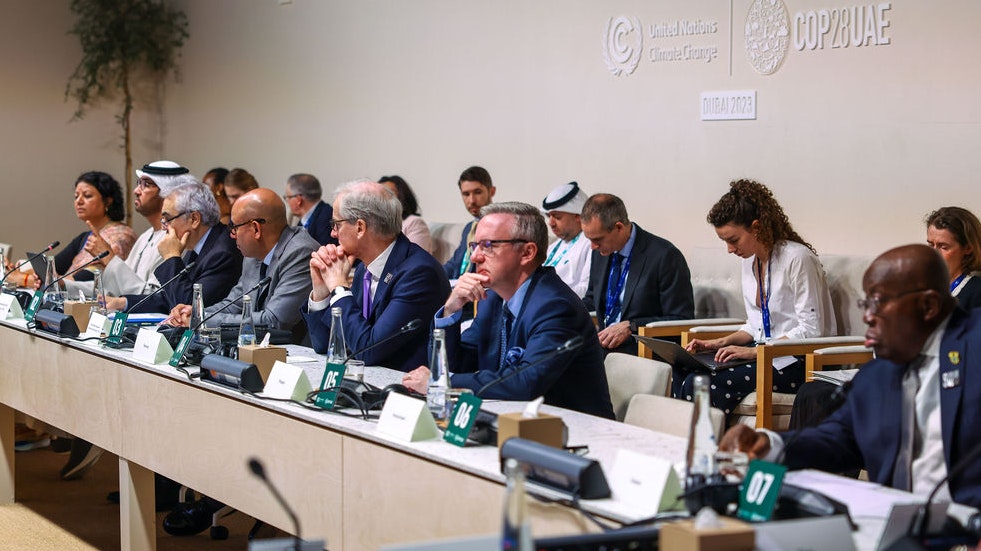COP28 and IEA High-Level Dialogues conclude with strong consensus on energy transition
News

COP28 Presidency and IEA held the last in their High-Level Dialogues series at COP28, with the final event featuring over 40 leaders from Europe, the Americas, Africa and Asia
The COP28 and International Energy Agency (IEA) High-Level Dialogues concluded with strong consensus on the key elements of the energy transition. The conclusion marks a significant achievement for the co-Chairs, COP28 President Dr Sultan Al Jaber and Dr Fatih Birol, Executive Director of the IEA.
The fifth and final Dialogue, held during the World Climate Action Summit as part of COP28 in Dubai, was attended by Heads of State and Government and international organisations.
Over 40 high-level leaders, including four Heads of State, concluded the dialogues with clear convergence on the building blocks of a 1.5 °C-aligned energy transition and strong support for an ambitious decision on the Global Stocktake at COP28.
Dr Birol set out an ambitious and integrated package across five pillars for COP28, for which there was strong support in the room:
- Tripling global renewable power generation capacity by 2030.
- Doubling annual energy efficiency improvements by 2030.
- An orderly decline of fossil fuel use demand by 2030, starting with no new coal plants.
- Commitment from the oil and gas industry to align their strategies and investment portfolios with 1.5 °C, with a focus on a 75% reduction in methane emissions by 2030.
- Financing mechanisms for a major scaling up of clean energy investment in emerging and developing economies.
Reflecting on the conclusion of the Dialogues, Dr Sultan Al Jaber told participants: “This series of dialogues has helped us to reach convergence on some of the critical elements of the energy transition. This work is crucial in building momentum to deliver the most ambitious response possible to the Global Stocktake, bridging the gaps to 2030, and helping us keep 1.5 °C – our North Star – in reach. I am encouraged by the practical actions brought forward by world leaders today at the final dialogue, and I hope that you take this open mindset and optimism throughout this COP.”
Dr Birol commented: “I’m encouraged by the support by governments around the world during the dialogue for the IEA’s five pillars for success at COP28, including the need by 2030 for tripling renewable capacity, for doubling energy efficiency improvements, for the oil and gas industry to meaningful commitment to clean energy transitions, for a massive increase in financing for developing economies, and for an orderly decline of fossil fuel use. We now need to see this support translate into concrete commitments and action.”
Attendees highlighted the strong support for the COP28 Presidency’s Global Renewables and Energy Efficiency Pledge, which to date has been signed by 127 countries. There was broad agreement on the need for urgent action on coal, not only on no new unabated coal plants, but also on accelerating the retirement of existing plants.
There was also acknowledgement that countries must seize the opportunity to develop and accelerate their own energy transition plans, while supporting developing countries with finance and technology transfer. Initiatives such as the Just Energy Transition Partnerships (JETPs) were highlighted as an effective mechanism for enabling a just and orderly energy transition that supports developing countries.
The final Dialogue follows a year of engagements, where key elements of the energy transition including renewables, energy efficiency, financing, fossil fuel demand and supply, and decarbonization have been discussed. The series of Dialogues have been conducted in conjunction with the International Renewable Energy Agency (IRENA) and supported by the United Nations Framework Convention on Climate Change (UNFCCC).
During the dialogue, world leaders displayed significant ambition to achieve concrete targets and accelerate deployment of renewable capacity and improve energy efficiency.